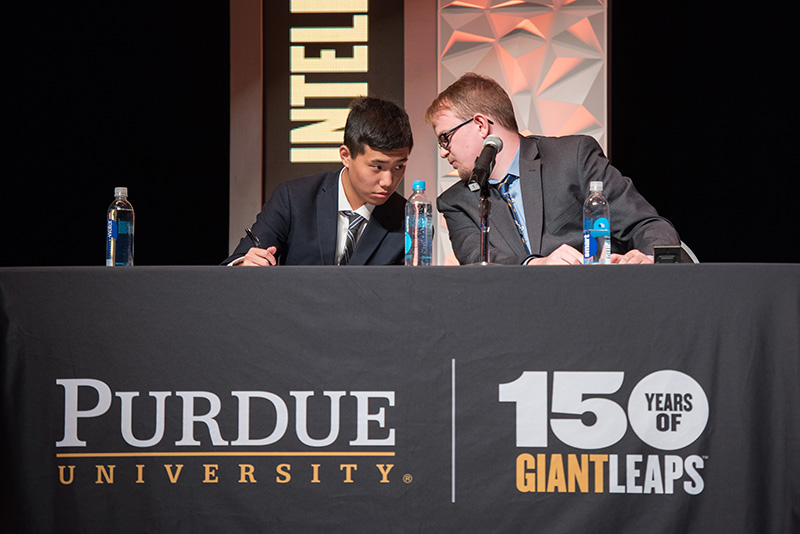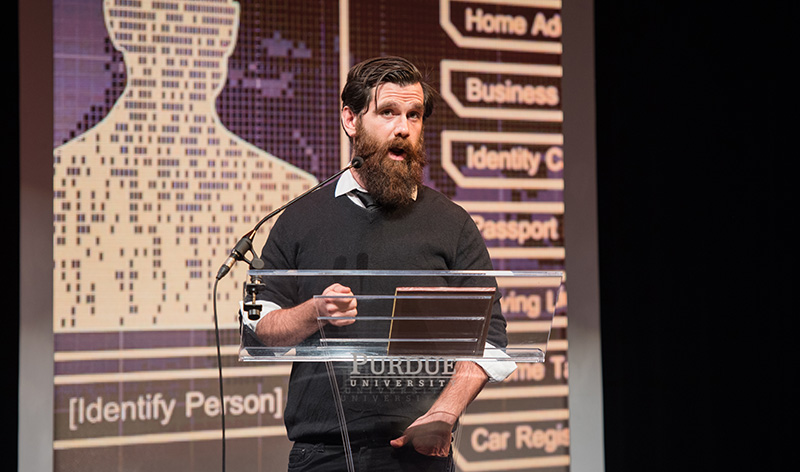Stating their case
Purdue debate team expands focus, aims to become annual contender

As a student at Loyola Marymount University, James Mollison became a nationally successful debate competitor without any of the resources available to those at bigger programs.
“Me and my partner were the third-place team in the nation in policy debate, and we didn’t have any coaches. We didn’t even have a team,” Mollison said. “It was just me and him, and we were quite successful.”
It makes sense, then, that Purdue’s debate coach is hardly intimidated by flying solo into a debate competition when the opposing team has as many as 10 coaches. The greater challenge is convincing young debaters that they are not at a disadvantage simply because they are outnumbered.
“I might be comfortable in this kind of situation, where I think, ‘They have too many cooks in the kitchen. We can come up with a wily, weird strategy, and we’ll get it done,’ ” Mollison said. “But a first-year debater might see 10 coaches surrounding their opponents and notice they just have me and their partner, and they may be intimidated. So, one challenge I face is trying to convey or infect our competitors with the confidence that I feel in that kind of situation.”
That situation exemplifies what Mollison faced over the last year as he worked to broaden a Purdue debate program that for years competed regionally in a single debate discipline, into one that competes nationally in multiple events.
It’s a small operation, but he’s getting by on guile as he attempts to recruit and instruct students who can help the program rank among the nation’s best on an annual basis.
“It’s kind of amazing. I didn’t think we’d get this far in a little over a year,” said head of philosophy Christopher Yeomans, who tapped Mollison to help the program grow. “This is all a testament to James’ work. For the money that Philosophy, Communication, and the Petticrew Foundation have put into the program, we have received an extraordinary return on our investment. To have expanded participation in our existing programs while adding two new programs – policy debate and mock trial – in one year is fantastic.”
A recruitment tool
As Yeomans hinted, the Philosophy Department and Brian Lamb School of Communication have in the last year earmarked funding to help cover travel costs, complementing the endowment that has supported Purdue’s Petticrew Forum for decades. C. Richard Petticrew, a 1936 Purdue graduate and Indianapolis insurance professional, established the endowment after competing in debate as an undergraduate, posting an undefeated record over four years with partner Bob Royster.While the endowment-supported Petticrew teams were regionally successful through the years, Yeomans and Lamb School head Marifran Mattson – both of whom competed in debate as students – decided to increase its funding in hopes that a nationally recognized speech and debate program could become a valuable recruitment tool.
“There are so many high school students who participate in speech and debate,” Mattson said. “That’s when I started doing it. So it’s a great way to bring high school students to campus and say, ‘We offer speech and debate opportunities here, and Purdue has all these other great opportunities here, as well.’ ”
To further those recruiting efforts, Purdue will host its first speech and debate camp in the summer of 2020.
“We’re hoping to get to a point like a lot of debate teams where they have a summer debate camp for high school students,” Yeomans said. “The problem is it’s a chicken-and-egg situation. You have to have a team that’s good enough to attract people to come, and then you use the funds that you raise from that summer program to fund your travel and other sorts of things. We’re not there yet, but for what we’ve got, we’re actually doing really well. We’re punching above our weight.”

In the 2018-19 academic year, Purdue substantially expanded its debate lineup. The team went from competing exclusively in parliamentary debate to also fielding competitors in policy debate and in individual events like Lincoln-Douglas debate.
It also added a mock trial team, which is as much a performance as it is a competition, and evaluates participants on the strength of their arguments. Mock trial teams include as many as 10 members who serve as prosecutors, defendants, and witnesses – compelling Mollison to reach out to the Rueff School of Design, Art, and Performance in search of actors who might be willing to participate.
“There’s definitely a theatrical element that you don’t get in other sorts of competitive speech and debate activities,” Mollison said. “In some individual events, there’s a sort of theatrical element, but there’s not the same degree of teamwork as in mock trial. You can have the best arguments in a mock trial round, but lose because your witnesses are not compelling or don’t make strong emotional appeals.”
Valuable communication skills
An aspect of Purdue’s team that might seem somewhat surprising is that it is not stocked with students exclusively from the humanities. There are certainly some of those, but several of Mollison’s top competitors are engineers and students in other STEM fields.As it turns out, those students also see the value in learning to make a compelling argument.
“There’s so much benefit,” said policy debater Daniel Joseph, a freshman from Northbrook, Illinois. “As a computer science major, we’re never really taught to have these kinds of persuasion skills. It’s not really part of the toolset of a CS major, and being able to spend so much time refining that is so helpful. A large part of the CS field is consultancy, and being able to have those communications skills and those persuasion skills is actually something that a lot of employers are looking for, but really isn’t part of any curriculum you’ll find around the country.”
Team member Payton Case said competing in parliamentary and Lincoln-Douglas debate allows him to scratch a competitive itch, while also preparing him for a future as a patent lawyer.
“This has a lot of applicable skills outside of debate itself,” said Case, a freshman from Denver, Colorado, majoring in aerospace engineering. “If you’re a good debater, you’re a better communicator, and it can definitely help you in school. I saw that very early on where I got better at persuading, not only in debate, but also throughout life.”
Joseph predicted that the Purdue team is on the verge of national success, thanks to the addition of several experienced debaters who will join the roster this year. After nearly placing in multiple tournaments in 2018-19, Joseph said the team only needs “one little push, and we’ll be there.”
That is exactly what Mollison hopes to see happen as the program gains a foothold. The intellectual capability has always been present within Purdue students. Now, with increased financial support and a budding recruiting effort under way, Mollison expects to someday see the program become a national contender in every event in which it competes.
“My vision is for us to be excelling simultaneously in all the activities we compete in as opposed to being good one year in one activity, then dialing back so we can succeed the next year in a different activity. That’s frustrating to me,” Mollison said.
“I want us to win in all of them. Instead of being good in just one activity, we should be threatening to every university in every kind of debate and speech. That’s the goal.”